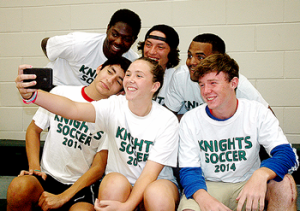
On the television, live from Brazil, it was Michael Bradley passing to Chris Wondolowski, who touched the ball to Clint Dempsey, who had a chance to send American fans into delirium.
In Savannah, Ga., the set play sure looked like it could have been Miguel Ulloa passing to Allen Parker, who would touch the ball to Jesus Ulloa.
When the United States Men¹s National Soccer Team competed in the knockout round of the World Cup against Belgium, the team almost tied the game on an extra-time set play that looked familiar to the Ulloa brothers and Parker, members of the Windsor Forest High School boys soccer team.
Turns out it was a play that coach Cam Turner had designed for his team’s high school games.
“We have that exact same play,” said Turner, who in 12 years has coached Windsor Forest¹s boys to 11 state-tournament appearances.
“I was like, Oh, what a play,” Miguel Ulloa said.
The World Cup’s exciting action and the United States¹ run through the group stage revved up soccer interest among the Windsor Forest players and also gave them a glimpse into the other countries¹ tactics and the elite players’ movement without the ball and timely overlapping runs.
The Knights experienced the action at home, in restaurants, with family and even after recovering from knee surgery. Soccer is the game they play, but the team took the World Cup as an opportunity to share the sport with friends and family.
Miguel Ulloa, 17, is a rising senior. The center back was impressed with Brazil’s David Luiz’s ability to make an impact on offense. A soccer
fan that follows the Premier League and La Liga, Ulloa spent the World Cup gathered with his parents and three brothers, eating barbeque and watching the action.
“It brought my family a lot closer,” said Miguel Ulloa, who had 12 goals for Windsor Forest this season.
The family rooted for Mexico and Ulloa’s father took Mexico’s elimination hard.
“My dad cried about it for two weeks,” he joked.
Parker’s father is from Ghana and is a big soccer fan. The two went to a Buffalo Wild Wings and watched the United States beat Ghana with a late
goal. Parker, 17, a rising senior midfielder, enjoyed spending time watching with his “really loud” dad. Until John Brooks‘ 86th-minute winner, that is.
“He was straight-faced,” Parker said. “No reaction.”
Liz Barcomb, 17, a rising senior on the girls team, focused on the goalkeepers. That’s her position and like most of her teammates, she enjoyed
the end-to-end action, but she took time to learn.
Barcomb has played since she was three years old. She was coached by her dad, and her two oldest sisters and older brother played at Windsor
Forest. Her younger brother, Alex, competes for the school. It¹s a bit of a soccer family and Barcomb aspires to improve, to play collegiately. She eyed
the goalkeepers.
“I paid attention to see what they do,” Barcomb said. Barcomb said she noticed on corner kicks that the goalkeepers did not focus completely on the
corner, but instead kept their eyes on the goal area and what was in front of and behind them.
“You need to see everybody in front of you,” Barcomb said.
She also tried to help her friends understand the game and the world’s passion for the sport.
“Just the thrill of it,” Barcomb said. ³You would just see fans in the stadium, everybody supporting different nationalities.”
Jesus Ulloa, 16, a rising junior forward, spent time this spring competing for the Under-15-16 South Carolina Battery Academy.
However, he tore his anterior cruciate ligament and needed surgery. On the opening day of the World Cup, he was in bed recovering, watching on
television as Brazil faced Croatia.
“It pushed me harder to rehab,” Jesus Ulloa said.
Donovan Walls, 16, a forward and Tyler Carr, 16, a goalkeeper, are rising sophomores. They watched in appreciation of the growing crowds and
support for soccer in this country. Carr aspires to play professionally. He said the growth of soccer is inspiring.
“It makes me want to get better,” Carr said.
Miguel Ulloa, Barcomb and Parker hope to play beyond high school, possibly at NAIA or Junior College schools. They’ve say they understand that
soccer’s increased interest in America means there will be better competition. They are motivated to work harder to achieve their goals.
“I hope and dream to one day be there,” Barcomb said.
